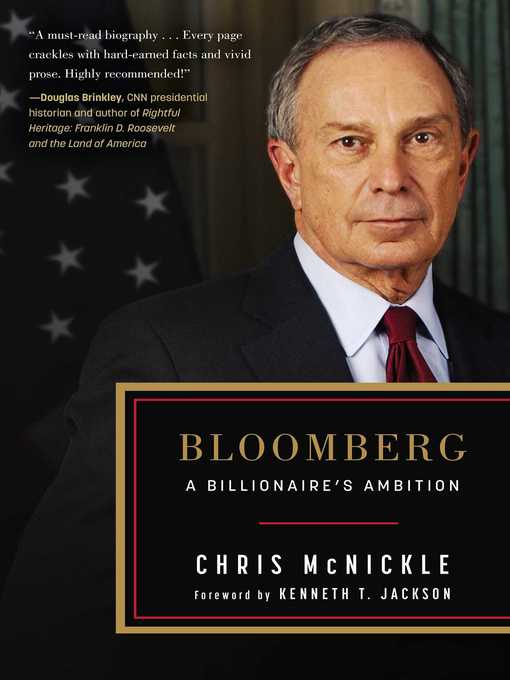
Bloomberg
A Billionaire's Ambition
کتاب های مرتبط
- اطلاعات
- نقد و بررسی
- دیدگاه کاربران
نقد و بررسی

June 12, 2017
McNickle (The Power of the Mayor: David Dinkins: 1990–1993), writes a thorough account of Michael Bloomberg’s 12 years as mayor. The author avoids the personal, briefly describing his subject’s middle-class upbringing and meteoric business career, and focuses instead on Bloomberg’s many political achievements, with an occasional look at his failures. Bloomberg is quoted describing himself as having “unbridled enthusiasm and a belief that anything is possible.” He pursued an ambitious agenda, taking on the problems of the country’s largest city with the certainty that he could solve them. McNickle praises Bloomberg but can be critical as well. He cites the mayor’s major achievements as averting economic disaster, keeping the city safe after 9/11, rebuilding the Twin Towers district, and using his business expertise to improve the city’s finances. However, McNickle argues, Bloomberg was less successful with schools, affordable housing and transportation, and alleviating income inequality. He is particularly critical of the huge amounts Bloomberg spent on his campaigns and how he overrode existing law to run for a third term. McNickle has created a comprehensive look at Bloomberg’s unique ability to take on New York City’s myriad problems.

August 1, 2017
Billionaire Michael Bloomberg (b. 1942) served as New York City's mayor from 2002 to 2013, first as a Republican and eventually as an Independent. During three terms in office, he presided over economic growth and falling crime but also provoked controversy for embracing the "stop-and-frisk" police tactic, widely condemned as racist and ultimately ruled unconstitutional. Ruling a business empire that includes Bloomberg.com, the politician was the first New York billionaire to win major elected office. Surprisingly, only two book-length biographies of the mayor existed before now: Joyce Purnick's Mike Bloomberg, and the autobiographical Bloomberg on Bloomberg. A former financial-sector executive with a PhD in history, McNickle satisfies the need for a current biography. After recapping Bloomberg's business successes and personal life, McNickle delves into Bloomberg's mayoralty, organizing his narrative by topic instead of time line, emphasizing policy decisions and execution. The market remains ripe for a more critical biography that grounds Bloomberg's leadership in the neoliberal vision arguably behind it. VERDICT A full, in-depth, favorable study of Bloomberg's mayoralty and impact on New York City that will appeal to readers who appreciate politics and political biographies--or who anticipate the billionaire's future presidential ambitions.--Michael Rodriguez, Univ. of Connecticut
Copyright 2017 Library Journal, LLC Used with permission.

July 15, 2017
A biography of three-term New York mayor Michael Bloomberg (b. 1942).There was a time, early on in Bloomberg's bid for the mayoralty of New York, that someone leaked a gag gift given to him by his staff, a 30-page compendium of foulmouthed, cynical sayings--"politically incorrect does not begin to describe them," writes McNickle, a former executive in global investment firms and treasurer of the American Historical Association. Consternation ensued, as political opponents lodged charges of racism, sexism, and classism in a race that got ever more heated--and, as the author writes, ever costlier, with Bloomberg, a media and real estate billionaire, spending $74 million to his Democratic opponent's $16.6 million. The big-ticket aspect of the narrative is a constant, for Bloomberg had endless resources and was committed to converting the city from "an unintended monument to time-gone-by into a place where the future could happen." In the course of that transformation, McNickle writes, large portions of the city became unaffordable, "one of the root causes of the long-standing homeless crisis." The author credits Bloomberg for some innovations in government operations but, in some of the sharpest critiques of the book, also notes that the current mayor, Bill de Blasio inherited a fantastic mess in terms of public housing and anti-poverty programs. Bloomberg also was slow to support the living wage, saying, "the last time we really had a big managed economy was the USSR and that didn't work out so well." Unafraid to use numbers or evoke fiscal policy, McNickle covers a lot of ground capably, arguing that Bloomberg's preference was always for market solutions to social problems, placing him as an economic and social centrist in a time of increasingly fringe-driven politics. A sturdy biography; though not uncritical, probably best suited to those inclined to be well-disposed toward Bloomberg and his years in office.
COPYRIGHT(2017) Kirkus Reviews, ALL RIGHTS RESERVED.

























دیدگاه کاربران